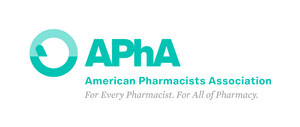WASHINGTON, Feb. 1, 2018 /PRNewswire-USNewswire/ -- Opioid abuse is a serious public health problem that has reached crisis levels across the United States, with more than 90 Americans dying each day from overdose of opioids, and many more becoming addicted. Recognizing the urgency and impact of this issue on the health of millions of patients across the country, a coalition that includes the American Pharmacists Association (APhA) issued a public statement today seeking support from the current Administration to address this growing epidemic.
The coalition, known as the National Conference of Pharmaceutical Organizations (NCPO), is a group of organizations and associations that collectively represent more than 300,000 pharmacy practitioners and pharmaceutical scientists, companies engaged in healthcare delivery, as well as pharmacy regulators and educators.
"APhA, along with the other NCPO members, is individually and jointly committed to identifying best practices to combat this public health crisis and moving swiftly to implement those practices across the country, " said APhA Executive Vice President and CEO Thomas E. Menighan. "We believe such collaborative efforts are important because the various organizations can bring important perspectives in helping to bring an end to this public health epidemic."
APhA has been active in promoting the inclusion of pharmacists as a necessary resource to curb the prescription drug and opioid abuse epidemic.
APhA has long advocated for the important role of the pharmacist in providing a variety of patient care services for patients taking opioid medications, such as utilizing prescription drug monitoring programs, identifying red flag warning signs, providing patients naloxone, and working on care teams to both prevent and treat substance use disorder. Pharmacist involvement in opioid use disorders helps improve access and outcomes, while reducing the risk of relapse.
In addition, APhA created an online opioid resource center to arm pharmacists with tools to improve pain management, while stemming opioid abuse and misuse.
Separately, the APhA Pain Institute, an intense lecture and debate series at the APhA Annual Meeting & Exposition, is designed to keep pharmacists up-to-date on the latest in the world of opioids. This full day of engaging, original content from the profession's leading experts prepares pharmacists to be able to recognize the psychology behind pain medication abuse, identify patients who misuse opioids and those with addiction, and manage both addiction and chronic pain.
"Pharmacists are and always have been on the frontlines of the opioid crisis, and will be a part of the many solutions to the problem," said Menighan. "They are actively working with patients and their communities on a daily basis, and APhA's priority is to make sure that policy makers and our fellow health care providers know what pharmacists can do to make meaningful progress in the fight against opioids."
About the American Pharmacists Association
The American Pharmacists Association, founded in 1852 as the American Pharmaceutical Association, is a 501 (c)(6) organization, representing 64,000 practicing pharmacists, pharmaceutical scientists, student pharmacists, pharmacy technicians and others interested in advancing the profession. APhA is dedicated to helping all pharmacists improve medication use and advance patient care and is the first-established and largest association of pharmacists in the United States. For more information, please visit www.pharmacist.com.
About the National Conference of Pharmaceutical Organizations
The National Conference of Pharmaceutical Organizations is a coalition of organizations and associations that represent the discovery, manufacture, and distribution of medications and practitioners with direct responsibility for effective patient care. The coalition includes the American Association of Colleges of Pharmacy, the American Pharmacists Association, the American Society of Health-System Pharmacists, Association for Accessible Medicines, Biotechnology Innovation Organization, Consumer Healthcare Products Association, Healthcare Distribution Alliance, National Association of Boards of Pharmacy, the National Association of Chain Drug Stores, the National Community Pharmacists Association, and the Pharmaceutical Research and Manufacturers of America.
SOURCE American Pharmacists Association
Related Links
WANT YOUR COMPANY'S NEWS FEATURED ON PRNEWSWIRE.COM?
Newsrooms &
Influencers
Digital Media
Outlets
Journalists
Opted In





Share this article